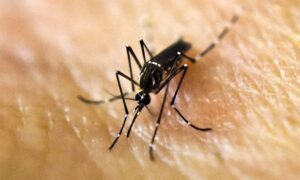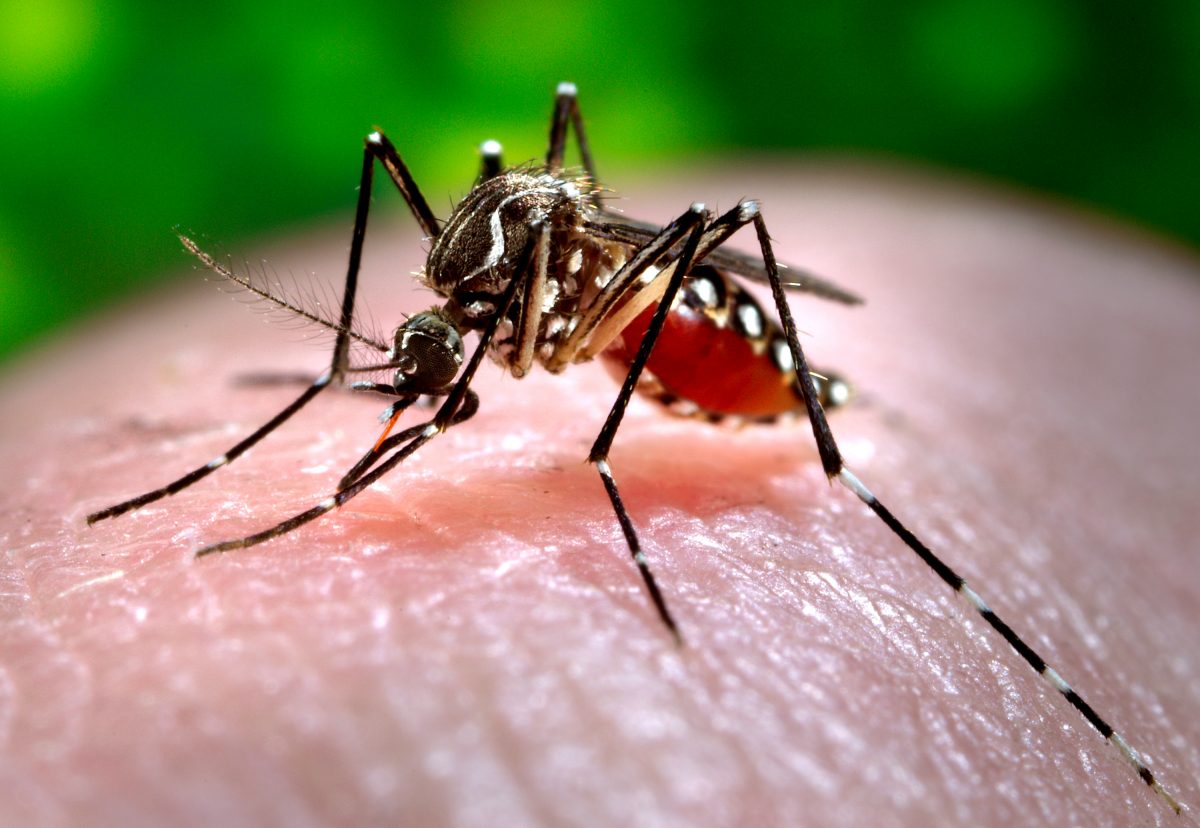Study Finds Some People Are ‘Mosquito Magnets’ Due to Body Odor
Summertime calls most of us to spend a nice evening outdoors, but that can sometimes turn into a horribly itchy ordeal, particularly for “mosquito magnets.”A new study published on Oct. 18 in the journal Cell by researchers at Rockefeller University suggests that some individuals are more attractive to the tiny blood-sucking insects than others due to having a higher level of certain chemicals in the skin. “There’s a very, very strong association between having large quantities of these fatty acids on your skin and being a mosquito magnet,” says Leslie Vosshall, a co-author of the study and neurobiologist at the New York-based private university. According to the researchers, every person produces unique body odors and these variations of human scent profiles were used to put “mosquito magnetism” to the test in an experiment on whose scent was most attractive to the globally invasive Aedes aegypti, a species of mosquito that spreads diseases like Zika, dengue, and yellow fever. The lead author of the study said 64 volunteers from the university were asked to wear nylon stockings around their forearms for at least six hours daily over a process of multiple days to pick up each person’s unique scent profile. In the end, the stockings were placed in separate traps at the end of a long tube in a closed container full of female Aedes aegypti mosquitoes. Male mosquitoes are not interested in your blood, but the females thirst for the protein and iron in your blood to produce their eggs. It can detect a number of chemical compounds on the human skin from up to 50 yards away. 100 Times More Attractive During the research that went on for several months, scientists held a round-robin tournament and concluded that some people’s stockings were more attractive to mosquitoes than others. The biggest mosquito magnet was notably around 100 times more attractive to the mosquitoes than the least attractive subject. “They would basically swarm to the most attractive subjects,” explained study author Maria Elena De Obaldia. “It became very obvious right away.” According to the study, the latest findings provide more scientific reasoning for the phenomenon of mosquito attraction than prior or existing theories based on blood type, blood sugar levels, or consuming garlic or bananas as a home repellent, says Vosshall. By testing the same people over multiple years, the study showed that these big differences stick around, said Matt DeGennaro, a neurogeneticist at Florida International University who was not involved with the research. “Mosquito magnets seem to remain mosquito magnets,” DeGennaro said. The research could help find new methods to repel mosquitoes, said Jeff Riffell, a neurobiologist at the University of Washington who was not involved with the study. There may be ways to tinker with skin bacteria and change humans’ tantalizing smells, he said. Simple Preventative Measures to Avoid Mosquito Bites The U.S. Centers for Disease Control and Prevention (CDC) has guidelines that include a number of tips on how to prevent mosquito bites, as well as multiple ways how to avoid the annoyance in the first place. This 2006 photo shows a female Aedes aegypti mosquito acquiring blood from a human host in Atlanta. (Centers for Disease Control and Prevention/James Gathany via AP) Naturally, the best way to avoid mosquito bites is to prevent coming into contact with them. While mosquitoes can bite at any time of day, they are most active between dusk and dawn, when it’s their prime feeding time. However, it’s not always possible to avoid being outdoors at these times of the day. Mosquitoes are more common in shrubby areas and near-standing water where they’re able to breed. A good and easy way to reduce the small pest near your home is to dump out any standing water to stop them from laying eggs and coming near your property. Installing screens also keeps mosquitos from slipping in a window, which is a popular way to avoid getting bitten. Or, if you don’t have screens, consider getting a fine mosquito net to hang over your bed or crib. Wearing light-colored, loose-fitting clothing—long-sleeved shirts and long pants, hats, and socks also help to keep bugs away. While health officials, including the American Mosquito Control Association (AMCA), recommend using commercial repellents, others have recommended avoiding most chemical repellents due to concerns over potential side effects of the spray, including skin irritation, redness, rash, and swelling. Some methods may work better than others for each particular individual, as mosquitoes are attracted to certain biochemical components in your skin. Got Bitten Anyway? When it comes to bites from these pesky insects, it’s difficult to resist that persistent itch. Fortunately, there are many natural and cheap ways to combat an uncontrollable itch. Aloe Vera—Due to its soothing nature and anti-inflammatory properties, Aloe Vera can instantly cool down the irritat

Summertime calls most of us to spend a nice evening outdoors, but that can sometimes turn into a horribly itchy ordeal, particularly for “mosquito magnets.”
A new study published on Oct. 18 in the journal Cell by researchers at Rockefeller University suggests that some individuals are more attractive to the tiny blood-sucking insects than others due to having a higher level of certain chemicals in the skin.
“There’s a very, very strong association between having large quantities of these fatty acids on your skin and being a mosquito magnet,” says Leslie Vosshall, a co-author of the study and neurobiologist at the New York-based private university.
According to the researchers, every person produces unique body odors and these variations of human scent profiles were used to put “mosquito magnetism” to the test in an experiment on whose scent was most attractive to the globally invasive Aedes aegypti, a species of mosquito that spreads diseases like Zika, dengue, and yellow fever.
The lead author of the study said 64 volunteers from the university were asked to wear nylon stockings around their forearms for at least six hours daily over a process of multiple days to pick up each person’s unique scent profile. In the end, the stockings were placed in separate traps at the end of a long tube in a closed container full of female Aedes aegypti mosquitoes.
Male mosquitoes are not interested in your blood, but the females thirst for the protein and iron in your blood to produce their eggs. It can detect a number of chemical compounds on the human skin from up to 50 yards away.
100 Times More Attractive
During the research that went on for several months, scientists held a round-robin tournament and concluded that some people’s stockings were more attractive to mosquitoes than others. The biggest mosquito magnet was notably around 100 times more attractive to the mosquitoes than the least attractive subject.
“They would basically swarm to the most attractive subjects,” explained study author Maria Elena De Obaldia. “It became very obvious right away.”
According to the study, the latest findings provide more scientific reasoning for the phenomenon of mosquito attraction than prior or existing theories based on blood type, blood sugar levels, or consuming garlic or bananas as a home repellent, says Vosshall.
By testing the same people over multiple years, the study showed that these big differences stick around, said Matt DeGennaro, a neurogeneticist at Florida International University who was not involved with the research.
“Mosquito magnets seem to remain mosquito magnets,” DeGennaro said.
The research could help find new methods to repel mosquitoes, said Jeff Riffell, a neurobiologist at the University of Washington who was not involved with the study. There may be ways to tinker with skin bacteria and change humans’ tantalizing smells, he said.
Simple Preventative Measures to Avoid Mosquito Bites
The U.S. Centers for Disease Control and Prevention (CDC) has guidelines that include a number of tips on how to prevent mosquito bites, as well as multiple ways how to avoid the annoyance in the first place.

Naturally, the best way to avoid mosquito bites is to prevent coming into contact with them. While mosquitoes can bite at any time of day, they are most active between dusk and dawn, when it’s their prime feeding time.
However, it’s not always possible to avoid being outdoors at these times of the day. Mosquitoes are more common in shrubby areas and near-standing water where they’re able to breed. A good and easy way to reduce the small pest near your home is to dump out any standing water to stop them from laying eggs and coming near your property.
Installing screens also keeps mosquitos from slipping in a window, which is a popular way to avoid getting bitten. Or, if you don’t have screens, consider getting a fine mosquito net to hang over your bed or crib.
Wearing light-colored, loose-fitting clothing—long-sleeved shirts and long pants, hats, and socks also help to keep bugs away.
While health officials, including the American Mosquito Control Association (AMCA), recommend using commercial repellents, others have recommended avoiding most chemical repellents due to concerns over potential side effects of the spray, including skin irritation, redness, rash, and swelling.
Some methods may work better than others for each particular individual, as mosquitoes are attracted to certain biochemical components in your skin.
Got Bitten Anyway?
When it comes to bites from these pesky insects, it’s difficult to resist that persistent itch. Fortunately, there are many natural and cheap ways to combat an uncontrollable itch.
- Aloe Vera—Due to its soothing nature and anti-inflammatory properties, Aloe Vera can instantly cool down the irritation, itchiness, and swelling of your mosquito bite.
- Lavender—What do lavender oil, tea tree oil, witch hazel, and cedar oil have in common? They all act as natural anti-inflammatories which can help bring down the swelling, infection, and pain associated with mosquito bites.
- Basil—If you have some fresh basil at home, you’re in luck! Basil is beneficial for repelling mosquitoes and treating their bites because they have anti-inflammatory properties.
- Milk—While milk is beneficial for relieving sunburns, it can also help your mosquito bites! For a more soothing way of treating the bites, make a compress by submerging a small towel or cloth in equal parts milk and water before applying it to the bite.
- Peppermint/Toothpaste—Dabbing a little peppermint oil or toothpaste on the bite produces a cooling sensation to alleviate the itching and swelling. All-natural peppermint toothpaste is recommended for toothpaste users.
Epoch Times reporter Deborah Kim and The Associated Press contributed to this report.
From NTD News












